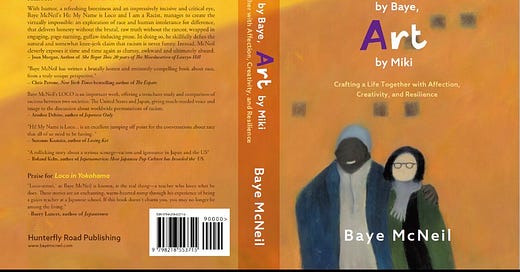In a bit of a departure from the usual, I’m doing a review of a book I recently read. Words by Baye, Art by Miki is the third book of Japan-based writer . To see more of McNeil’s work, head over to www.bayemcneil.com. I received an ARC of the book, but opinions are my own.
Words by Baye, Art by Miki was my first experience with any of Baye McNeil’s work. While I haven’t read his articles or other books, I feel that Words by Baye, Art by Miki is a culmination of sorts. It’s partly an ode to McNeil’s wife, Miki, but also explores the facets of McNeil’s life in Japan that have defined his experience over the years. At its heart, it’s a recollection of tales that cover love, loss, race, work, society, and family. McNeil touches upon so much in this work—all by recounting tales from his life—that I wished I had explored his work more before I read Words by Baye, Art by Miki. However, even without more context, I recommend anyone interested in Japan or living in Japan to read this book.
McNeil’s tales of struggle with life in Japan are one of the core aspects that I, as a fellow American living in Japan, connected with most. On one hand, McNeil’s tales are universal, despite one’s background. His poignant writing style and humor get at some of the uniformity of the gaijin experience in Japan. In one chapter, he recounts how, while all the teachers at his school were referred to by their last names (as is customary and respectful in Japan), he was ‘Baye-sensei’ because he’s a foreigner. In the next, he talks about helping to change school policy about an activity where students approached ‘foreigners’ (i.e., foreign-looking people), to speak English with in Kyoto. Yet, on the other, McNeil’s experience is deep and nuanced. He explores what it means to be a Black man in Japan, and what it means for Japan for him to be a Black man in Japan. He writes about insightful conversations he had with his Japanese students or his wife about race. His frustrations, successes, tears, and triumph are all laid out on the page in a personal tale that spans a lifetime. I can only imagine the courage that it took to write this book.
Yet, Words by Baye, Art by Miki is not only an exploration of race and the foreigner experience in Japan, it is also the tale of Miki, told from McNeil’s perspective. In countless chapters throughout the book, Miki takes on different roles such as painter, artist, and carpenter. Her art adorns the pages of the book and brings it to life. The book recounts their arguments and endearing moments. It delves into the tough parts of their experiences as a global couple living in Japan, but also sings the praises of the beautiful parts. It explores their partnership, captured beautifully in the title of the book: Words by Baye, Art by Miki. The book is an ode to this ‘collaboration’ and to the Japan that they have created together.
And, that, I believe, is the heart of the book. It is an exploration of finding one’s own Japan. The road is fraught with difficulties and trials. McNeil shows readers both the good sides of Japan and the darker sides—racism and fear of the other. But ultimately, it is a tale of love, and with Miki’s help, McNeil seems to have found his Japan.
I think that anyone interested in Japan or living in Japan can benefit from reading this book, but I think that people living here as immigrants or long-term residents will find much truth in the words McNeil has written. It is an inspiring read and one that I’ve found myself thinking about long after finishing the book.
The book releases on December 16. You can pre-order a copy of the book here.





